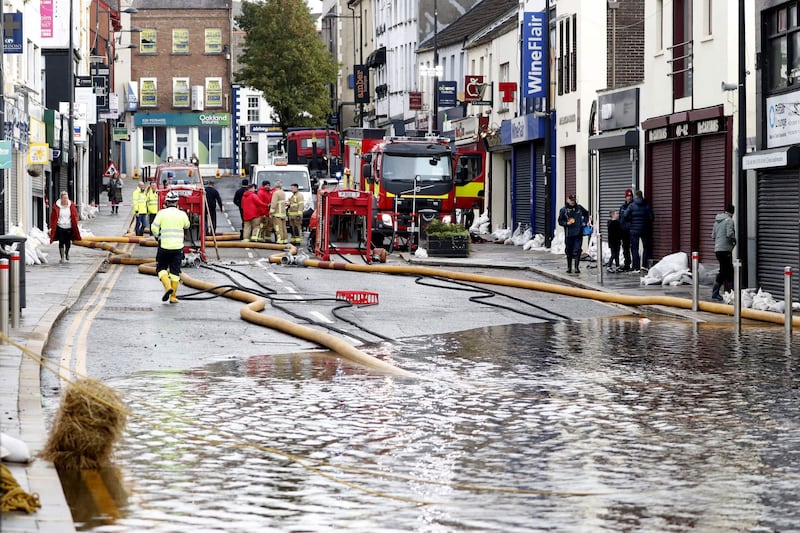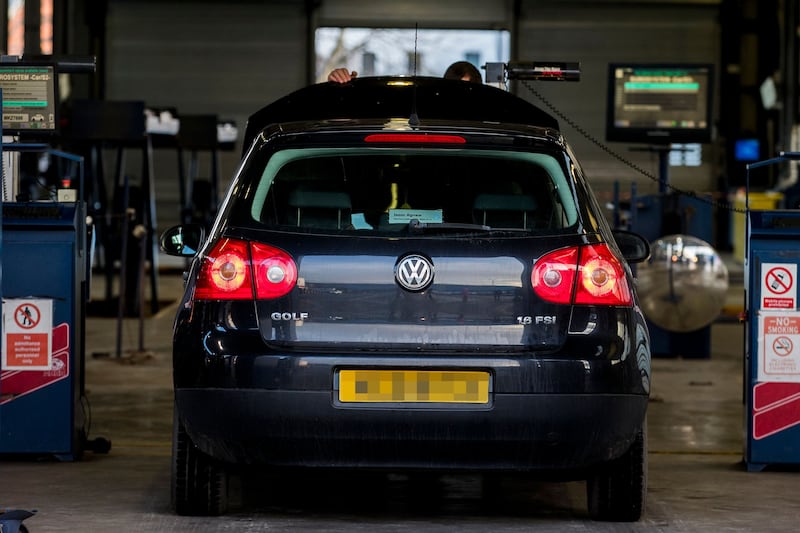Some £30 million of investment will be needed to provide new flood protection infrastructure, department leaders have said.
Jonathan McKee and Gary Quinn, who lead the Rivers team at the Department for Infrastructure (DfI), also said that the department needs funding to develop a flood forecasting system to predict what level rivers will rise to during heavy rain.
Several towns in Northern Ireland including Newry, Downpatrick and Portadown were badly impacted by flooding as a result of heavy rain in recent weeks.
Businesses and homes were in some places under water which was chest height, in what was the wettest October in 150 years.

More than 22,000 sandbags were deployed by the DfI as people tried to mitigate the damage to their properties.
Mr McKee said that £30 million of capital investment would be needed to protect Northern Ireland from flooding in the future.
“In broad terms, in terms of the infrastructure needs and in terms of the maintenance of our infrastructure, we need to have at least £30 million for the year to provide new flood alleviation infrastructure, flood management infrastructure,” he said.
“On top of that we need £8 million to maintain the infrastructure that we have, and within that eight million, two million of that would be needed to develop a flood forecasting centre.”
The DfI is currently able to send out messages in real time in relation to river levels, but Mr McKee and Mr Quinn said that there is a flood forecasting system that can predict where river levels will reach after a predicted level of rain.
“What we can’t do is actually predict that with the amount of rainfall that’s going to fall in that particular catchment, the river is going to rise to X metres,” Mr McKee said.

“If you knew that information, then you could realise this is a community that’s going to be vulnerable and they need to actively deploy sandbags or move some of their possessions upstairs.
“So whilst we do have the ability to send text alerts on where the rivers are in real time, we don’t have that ability to predict where it’s ultimately going to get to, and as you all understand that will be really vital going forward.”
There has not been a devolved government in Northern Ireland for more than a year due to the DUP’s ongoing boycott of powersharing institutions in protest against post-Brexit trading arrangements.
In the absence of an assembly and executive, Northern Ireland Secretary Chris Heaton-Harris reallocated £15 million of emergency flood relief funding.
The DfI, which earlier this year stated it is facing a funding gap of £112 million, said there are no plans for any of the £15 million of emergency funding to be made available to the department.
Some 45,000 homes in Northern Ireland are currently situated on flood plains and the DfI estimates this could rise to 60,000 with the impact of climate change.

Mr McKee said: “There’s a big need here and the risk is significant.”
“What do we need to invest to manage that risk to an acceptable standard? And that’s the £30 million for the new infrastructure, and the £8 million to maintain what we have and provide a flood forecasting centre,” he said.
“We do the best with what we are allocated, but we would like to do more and what’s restricting us from doing more is a lack of finance.”
Mr Quinn said that the maintenance of flood infrastructure needs to be implemented across Northern Ireland as more frequent spells of heavier rain put more areas at risk outside of traditional flood plains.
“I know the focus is on the south and east, but in recent times we’ve had flooding in Castlederg, almost flooding in Fintona, flooding in Drumahoe, Eglinton, Omagh, all these places,” he said.
“And all that minor watercourse maintenance protects homes and villages in those areas.
“So it’s important that we don’t lose focus here and that we keep an eye on all of Northern Ireland, not just south and east.”
The department is carrying out flood studies into various affected areas.
Flooding in Downpatrick was believed by many residents to be caused by a lack of maintenance of the nearby Quoile River.
Mr Quinn said that dredging the river may not be economical due to a minimal impact on flood prevention.
“There’s also calls for dredging. Dredging has minimal benefit, and particularly if you look at the scale of the Quoile pondage, it’s absolutely huge, and would come at a massive cost,” he said.
“And one would have to question that against what will come from this flood study.
He added: “You don’t want to be throwing money to maintenance where money and capital investment may prove more effective over a longer period of time.
“So yes, we’re aware of that, we’re dealing with it. It didn’t cause the flooding in Downpatrick, absolutely not.”








